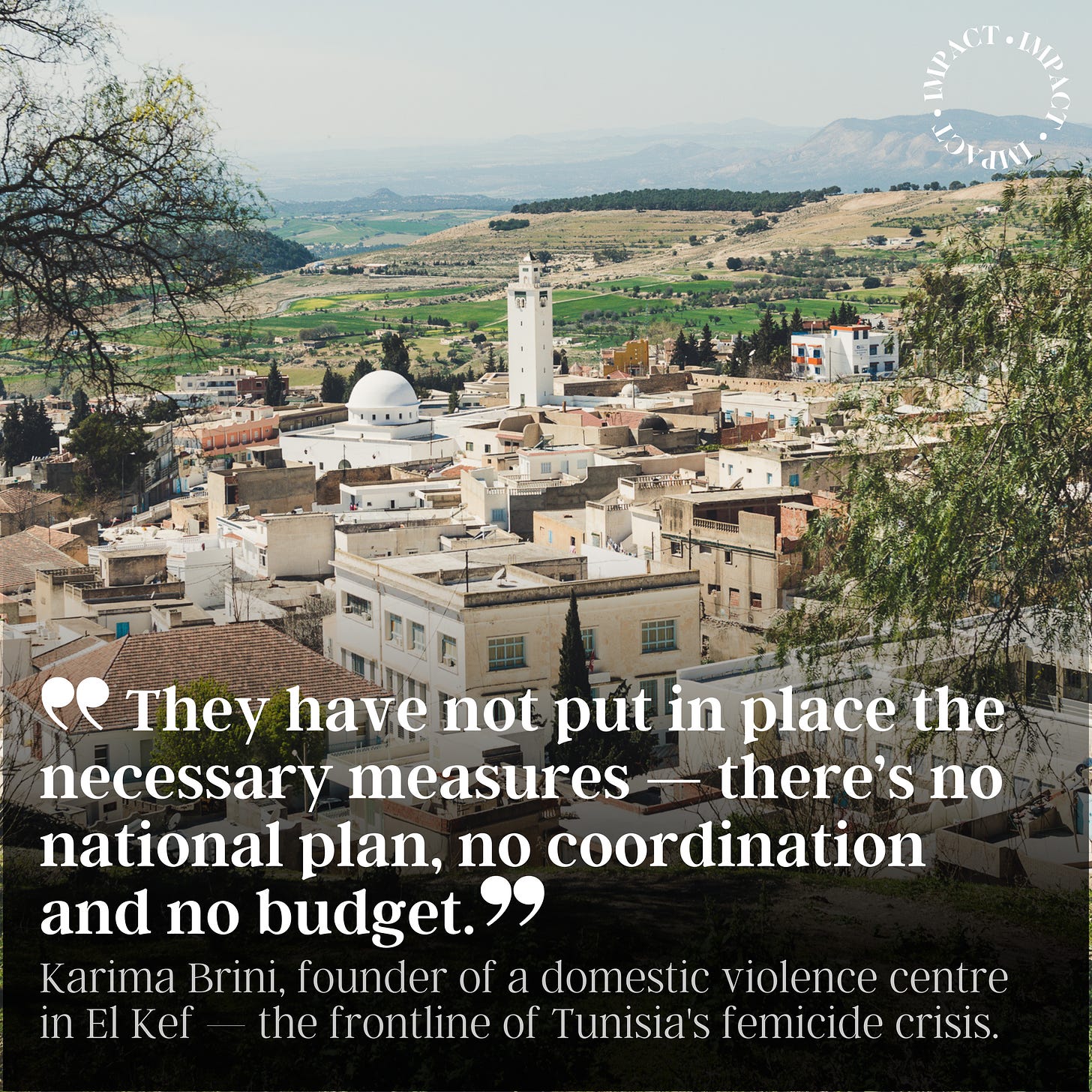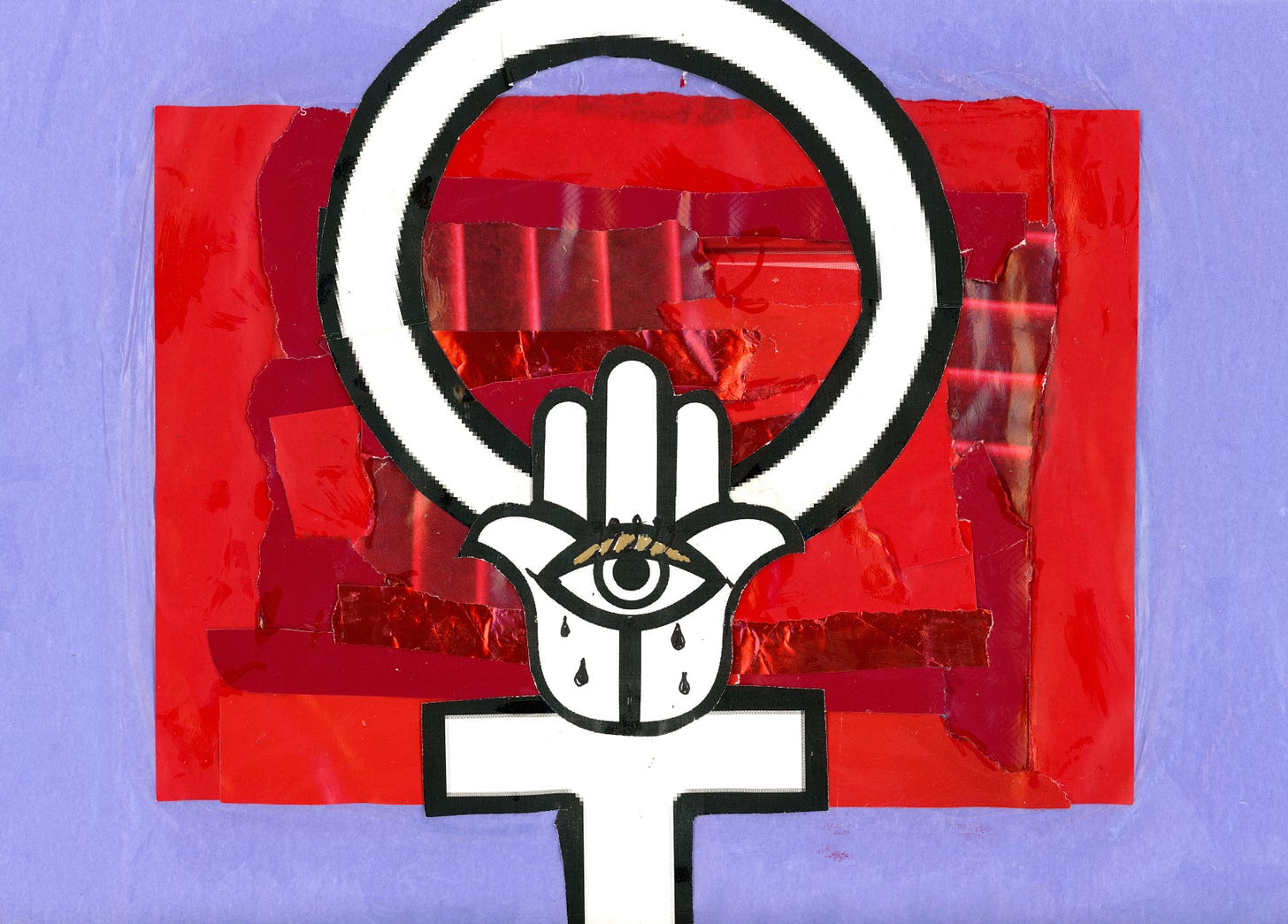Inside a women’s centre on the frontline of Tunisia’s femicide crisis
‘The stress is enormous’ as activists struggle to keep services running
By Elizia Volkmann
Only have a minute to read this newsletter? Here it is in brief:
- 🇹🇳 Tunisia was supposed to be a leading light in the region for its approach to violence against women.
- 📝 Yet its once groundbreaking laws are failing victims amid an economic and political crisis.
- 🏠 We take you inside the El Manara women’s centre in El Kef, where anti-femicide activists are continuing to help victims of violence, despite rising cases and declining funds.
Read on for more. And if you want to be up-to-date on feminism worldwide, follow us on Twitter and Instagram.
Parlez-vous français ? Impact is also available in French:
Storm clouds gather over the green mountains of El Kef, warning of rain and snow to come. “It’s a zone of extreme poverty,” says Karima Brini as we drive through the city to the El Manara women’s centre.
Amid worsening food shortages and political instability, this will be a winter of empty bellies, shivering cold and frayed nerves in the western Tunisian city. Brini, the co-founder of the women’s rights organisation Association femme et citoyenneté (the Association of Women and Citizenship), which runs the El Manara centre, fears the deteriorating conditions could also lead to a further increase in domestic violence.
A wave of femicides began spreading across Tunisia last autumn, starting in El Kef with the murder of Wafa Sabai, who was burned to death by her husband on October 29th.
Sabai had been awarded a protection order alongside her divorce, but the order was not enforced.
“The point of separation is often the most dangerous for women,” Brini said. “Domestic violence is about domination by a man who regards [his partner] as his property. When she becomes more empowered or leaves, he tries to re-assert his power.”
Members of Association femme et citoyenneté and their supporters took to the streets in protest after Sabai’s murder and an alliance of feminists submitted a petition calling on the government to implement a national plan to tackle femicide and to apply Law 58, the groundbreaking 2017 legislation that was intended to address gender-based violence in Tunisia.

Activists say Sabai’s case is emblematic of a gap between the intentions of Law 58 – which dramatically expanded the range of punishable crimes relating to violence against women and, at least in theory, provided financial, social and legal support to victims – and its implementation on the ground. To complicate the matter further, the personal status law of 1956, which designates a husband or father as the official ‘head of the family’ and limits women’s inheritance rights, is seen by many as undermining Law 58.
Now, in a context of rising authoritarianism and a sharpening economic crisis, activists fear the situation will only deteriorate further for women at risk of domestic violence. It’s left to feminist groups and women’s associations to carry on the work they say the government isn’t doing.
“The [women’s] ministry hasn’t taken their role seriously. They have not put in place the necessary measures — there’s no national plan, no coordination and no budget,” Brini said.
Sabai’s murder revived memories of 26-year-old Refka Cherni, who was shot five times by her husband, a national guard, in May 2021. Days before, she had tried to report him to the police for domestic violence, taking a medical certificate with her to support her case.
“The prosecutor accepted her complaint but didn’t order the arrest [of her husband],” Brini said.
Cherni withdrew her complaint after being pressured by her family. Still, under Law 58, the state prosecutor can proceed with legal action even if the victim withdraws her complaint. Instead, “it was left till the following Monday for him to surrender his weapon,” Brini said. By then it was too late. “Refka filed her complaint on a Thursday and was killed on the weekend.”
After Cherni’s murder, the Ministry for Women pledged to fight femicide, while feminist groups launched an awareness campaign, #sayhername, to push the government to make good on their promise to fully implement Law 58 and establish specialist units in police stations across the country that are fully equipped to deal with domestic violence complaints.
The momentum didn’t last — on 25th July 2021, Tunisian president Kais Saied sacked his entire government, including the Minister for Women, Children and Families, and froze parliament, putting any such plans on hold. The new ministry did not respond to a request for comment on its plans to address femicide before the publication deadline.

Entering El Manara, Brini lowers her voice and quietly introduces her colleagues, who are huddled in their coats to stay warm. Everyone speaks softly inside the centre. This is a place where the only loud voices belong to the women who come seeking help.
Salhea ben Ali started working at the centre as a community educator, leading awareness workshops with women, explaining their rights and how to access services. Now she works full time in the centre d’écoute, or listening centre, where women suffering violence can come to seek help.
“Women arrive in a state of fear,” she says. “The first thing is to reassure them that they are not alone in the situation, that they have people ready to help.”
During a typical listening session, ben Ali assesses the type of violence and level of risk a woman is subject to, and then directs her to social and legal advisors, or takes her to the police or hospital. “In urgent cases, we find a safe place for her to stay.”
The centre’s workers exude calm, but when asked about the impact of the job there’s a loud sigh and Brini and ben Ali laugh. “Oh, the stress is enormous!” they say in unison.
Tunisia does not collect official statistics on femicide. According to Human Rights Watch, Tunisian police registered nearly 69,000 complaints of violence against women and girls in 2021, a figure which is believed to be an underestimate, given that not all victims come forward.
Brini says the centre has seen a 50% rise in the number of cases since 2019. She suspects the true extent of the problem is much greater. “Most of the cases come from the urban district of El Kef. Because there’s no rural transport, it is very difficult for the women in the countryside to come to us.”
Most of the women who access their service come on their own. “Emergencies are rare, though one father hired a truck to bring his daughter to us. He laid her on a mattress as she’d suffered multiple fractures to her arms, legs and chest after her husband beat her with a shovel,” she said.

Meanwhile, shelters have been closing despite a pledge from the women’s ministry to open one in each of the country’s 24 governorates by 2024.
The Association femme et citoyenneté had begun work on converting a former children’s home into a domestic violence shelter with disabled access, but Brini said work has had to stop while they wait for the ministry to release the funds required.
The women’s ministry did not respond to a request for comment on the status of funding for the El Manara centre, or on the plan to open more centres, before the publication deadline.
El Manara’s clinical psychologist, Chaymaa Benalayaa, sees an average of 15 clients for three or four sessions for each beneficiary each month. Her oldest client is 64 years old.
“The main psychological problems that the women suffer from are PTSD and depression,” Benalayaa says. “I find narrative therapy is the most effective for this – they are finally able to express themselves and let out the pain and sadness they have not been able to share with anyone, not even their mother or sisters.”
Yet as of this month, Benalayaa’s services are no longer on offer at El Manara. Her position was funded by the women’s ministry, and that funding has run out.
“It’s my last day here on January 21st,” Benalayaa says. “I don’t know if they will fund my post and we will restart the work or not.”
— Elizia Volkmann covers the Maghreb and Sahel for major newspapers and is the TV correspondent for Al Jazeera. She has a special interest in human rights, especially women’s and children’s rights.
— Mythili Sampathkumar is an independent journalist based in New York.
In Paris? Say hello at the Festival de l’Infolettre
Impact editor Megan Clement will be part of a roundtable for the Festival de l’Infolettre at Ground Control this Thursday February 2 at 19:00. She’ll be discussing the role of journalism and activism in the newsletter world with Lauren Boudard and Dan Geiselhart from Climax and Tech Trash, Jean-Paul Deniaud from Pioche! and journalist Jennifer Padjemi. Event in French.
Admission is free but places are limited. Book your spot here.
